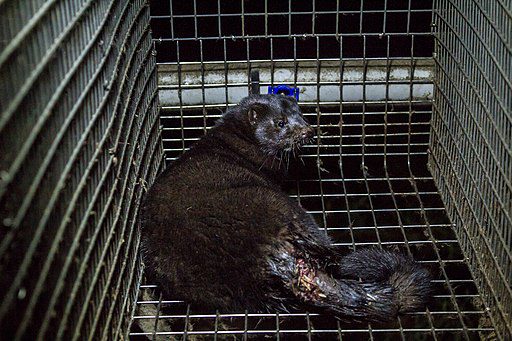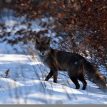
UK: 67 scientists write open letter imploring fur ban to prevent coronavirus pandemic risk
As veterinary surgeons, virologists, epidemiologists, infectious disease specialists and animal behaviourists, we believe that outbreaks of SARS-CoV-2, the virus that causes COVID-19, on mink fur farms in multiple countries across Europe as well as in North America, present another compelling reason for governments around the world to consider ending the farming of animals for fur.
Outbreaks of the virus on mink fur farms have been officially documented thus far in the Netherlands, Denmark, Poland, Lithuania, Greece, Spain, Sweden, France, Italy, Latvia, the United States and Canada. This is deeply concerning both from an animal health and public health perspective. Research using whole genome sequencing has concluded that a significant number of people working on fur farms have become infected with SARS-CoV-2 by mink in rare, but concerning, cases of animal to human disease transmission. It has further been shown that infection in mink can lead to mutations of the spike-proteins which, if transmitted to human populations, could potentially risk undermining the efficacy of vital vaccines.
It is clear that fur farms have the potential to act as reservoirs of SARS-CoV-2. Mink are certainly highly susceptible to this virus, but another fur-farmed species – raccoon dogs – is also capable of contracting it. Some scientists have postulated that fur farms in China, the largest fur producer in the world, could yet be implicated as having played a role in the early transmission of the virus in China, as a potential missing link. Given the scale of the industry in China, and the conditions for the animals on farms, it is at least a plausible source.
Mink are particularly susceptible to respiratory diseases. Additionally, the intensive breeding conditions typical on fur farms – animals unnaturally crowded together, poor hygiene, stress, injuries and low genetic diversity – are ideal for the creation and spread of novel pathogens. Footage taken on fur farms in countries all over the world consistently expose evidence of poor welfare conditions, and we note that fur industry certification schemes do not meaningfully improve animal welfare, nor satisfactorily address disease risk potential for live or dead animals. Severe animal welfare deficiencies are inherent to factory fur farming, and the trade creates potential for the many tens of millions of animals on fur farms to act as immediate, intermediate or amplifier hosts for viral pathogens. Even if the immediate threat of SARS-CoV-2 abates at a later date, such as through the development of a vaccine for these species, the low welfare and high-density nature of fur farming makes this industry susceptible to other pathogens in the future. As such, the next global pandemic could well find its origins or be spread through the exploitation of animals for the production of fur. To risk jeopardising our ability to control and end this or future global coronavirus pandemics, for the sake of fur fashion production, would seem imprudent.
We therefore support the call by Humane Society International for a permanent global end to the breeding, keeping and killing of animals for the purposes of fur production, and the sale of fur.
From a Letter to Boris Johnson 4th June 2021
Signatories:
1. Marc Abraham BVM&S MRCVS, UNITED KINGDOM
2. Inês Ajuda, DVM, MSc, Programme Leader Farmed Animals, Eurogroup for Animals, BELGIUM
3. Bo Algers, Professor emeritus, Swedish University of Agricultural Sciences, SWEDEN
4. Professor Michael C. Appleby OBE, University of Edinburgh, UNITED KINGDOM
5. Dr Sandra Baker, BSC (Hons) DPhil, Research Fellow, Department of Zoology, University of Oxford, UNITED KINGDOM
6. Juan Miguel Barros Dios, PhD, Professor of Preventive Medicine and Public Health, Director of the Radon Laboratory of Galicia, Center for Biomedical Research in Epidemiology and Public Health Network (CIBERESP), SPAIN
7. Professor Matthew Baylis, Chair of Veterinary Epidemiology, University of Liverpool, UNITED KINGDOM
8. Professor Diana Bell, Professor of Conservation Biology, School of Biological Sciences, University of East Anglia, Norwich, UNITED KINGDOM
9. Dr Helen Bolter MRCVS, UNITED KINGDOM
10. Vanessa Carli Bones, Post-Doc, PhD, MSc., Veterinary Surgeon, BRAZIL
11. Dr Ciara Clarke BSc Hons, BVSc, MRCVS Veterinary Surgeon, UNITED KINGDOJM
12. Claire Coupaud Mellado BVSc MRCVS, UNITED KINGDOM
13. Prof. Dr. Gonçalo Da Graça Pereira, DVM, MsC, PhD, Dip ECAWBM (BM), Dip ECAWBM (AWSEL), European Veterinary Specialist in Behavioural Medicine (Companion Animals), PORTUGAL
14. Nicola Decaro, DVM, PhD, Dipl. ECVM, Full Professor of Infectious Diseases of Animals, Department of Veterinary Medicine, University of Bari Aldo Moro, ITALY
15. Dr Ankush Dhariwal, Infectious Diseases/ Microbiology doctor, FRCPath, DTMH, MRCP, MBChB, BSc, UNITED KINGDOM
16. Ilaria di Silvestre, BVSc MSc on Animal Behaviour and Ecology, BELGIUM 17. Professor Cathy Dwyer, BSc, PhD, Professor of Animal Behaviour and Welfare, SRUC and Director of the Jeanne Marchig International Centre for Animal Welfare Education, UNITED KINGDOM
18. Prof Sarah Edwards, Professor of Bioethics, University College London, UNITED KINGDOM
19. Dr. Dwight Ferris, MD, FRCPC, infectious diseases consultant, clinical assistant professor, University of British Columbia, CANADA
20. Bruce Fogle MBE DVM MRCVS, President of the RSPCA Sussex Chichester & District Branch, UNITED KINGDOM
21. Dr Luke Gamble BVSc DVM&S FRCVS, Chief Executive at Worldwide Veterinary Service and Mission Rabies, UNITED KINGDOM
22. Magnus Gisslén, Professor of Infectious Diseases, The Sahlgrenska Academy at University of Gothenburg, SWEDEN
23. Dr. Pete Goddard, BVetMed PhD DipECSRHM DipECAWBM (AWSEL) MRCVS, EBVS European Veterinary Specialist in Animal Welfare Science, Ethics and Law, UNITED KINGDOM
24. Nellie Goetz, DVM, MPH, Executive Director of Altered Tails Barnhart Clinic, Arizona, and former Clinical Assistant Professor of Shelter Medicine at Midwestern University, Arizona, UNITED STATES
25. Emma Goodman Milne BVSc MRCVS, FRANCE
26. James Greenwood, BVSc MRCVS, UNITED KINGDOM
27. Jan Hajek MD FRCPC, Infectious Diseases Specialist, Clinical Assistant Professor of Medicine, University of British Columbia, CANADA
28. Gail R. Hansen, DVM MPH, former state epidemiologist and state public health veterinarian for the Kansas Department of Health and Environment, UNITED STATES
29. Lauren Henderson, DVM, MPH, UNITED STATES
30. Cat Henstridge BVSc MRCVS, UNITED KINGDOM
31. Dr. Kathrin Herrmann, PhD, DipECAWBM (AWSEL), Veterinary Specialist in Animal Welfare Science, Ethics and Law; Animal Protection Commissioner of Berlin, GERMANY, and Faculty Senior Associate, Johns Hopkins University, UNITED STATES
32. Dr Joanna Hockenhull BSc (hons) MSc PhD member of the Animal Welfare and Behaviour Research Group, UNITED KINGDOM
33. Dr Mark Jones BVSc MSc (Stir) MSc (UL) MRCVS, UNITED KINGDOM 34. Dr Laura Kahn MD, MPH, MPP, Research Scholar, Program on Science and Global Security, Princeton University, and Co-Founder of One Health Initiative, UNITED STATES
35. Barry Kipperman, DVM, DACVIM, MSc, DACAW, Instructor, Veterinary Ethics, University of California at Davis, Board President, Humane Society Veterinary Medical Association, UNITED STATES
36. Professor Andrew Knight MANZCVS, DipECAWBM (AWSEL), DipACAW, PhD, FRCVS, PFHEA, Professor of Animal Welfare & Ethics, & Founding Director, Centre for Animal Welfare, University of Winchester, UNITED KINGDOM
37. Professor Hans Jørn Kolmos, MD DMSC R, Research Unit of Clinical Microbiology, University of Southern Denmark, DENMARK
38. Dr Constantinos S. Kyriakis, Assistant Professor of Virology and Animal Diseases, College of Veterinary Medicine at Auburn University, UNITED STATES
39. Ken Langelier OBC DVM, CANADA
40. Dr Natasha Lee, DVM MSc, MALAYSIA
41. Joann Lindenmayer, DVM, MPH, Associate Professor of Public Health (adjunct), Tufts University School of Medicine, Northeast Director of the Evidence-based Veterinary Medical Society, UNITED STATES
42. Professor Jiahai Lu PhD, Professor of Epidemiology & Microbiology, Director of Center of Inspection & Quarantine at School of Public Health, Sun Yat-Sen University, CHINA
43. Dr Henriette Mackensen, DVM, Deputy CEO of Science, Animal Welfare Academy, Deutscher Tierschutzbund, GERMANY
44. Prof. Alastair MacMillan BVSc MSc PhD FRCPath MRCVS, UNITED KINGDOM
45. Siri Martinsen, veterinarian, Director of NOAH, NORWAY
46. Dr. Steven P. McCulloch BVSc BA PhD FHEA DipECAWBM (AWSEL) MRCVSEBVS European Veterinary Specialist in Animal Welfare Science, Ethics and Law, Senior Lecturer in Human-Animal Studies, University of Winchester, UNITED KINGDOM
47. Dr. Alan McElligott, Associate Professor of Animal Behaviour and Welfare, Jockey Club College of Veterinary Medicine and Life Sciences, Department of Infectious Diseases and Public Health, City University of Hong Kong, HONG KONG
48. Dr Dorothy McKeegan, BVA Animal Welfare Foundation Senior Lecturer, Institute of Biodiversity, Animal Health and Comparative Medicine, College of Medical, Veterinary & Life Sciences, University of Glasgow, UNITED KINGDOM
49. Dr Scott Miller BVSc MRCVS Veterinary Surgeon, UNITED KINGDOM
50. Dr. Hanns Moshammer, Associate Professor of Environmental Health at the Medical University of Vienna, AUSTRIA
51. Dr Elizabeth Mullineaux MRCVS, RCVS Specialist in Wildlife Medicine (Mammalian), UNITED KINGDOM
52. Elena Nalon, DVM, PhD, Senior Veterinary Adviser Farmed Animals, Eurogroup for Animals, BELGIUM
53. Prof Christine Nicol, MA, DPhil (Oxon), Professor of Animal Welfare at Royal Veterinary College, UNITED KINGDOM
54. Dr Sarah Otto, Killam University Professor, Department of Zoology, University of British Columbia, CANADA
55. Dr Romain Pizzi BVSc MSc PhD DZooMed DipECZM MACVS(Surg) FRES FRSB FRGS FRCVS, Royal College of Veterinary Surgeons recognised specialist in Zoo & Wildlife Medicine and European recognised specialist in Zoological Medicine (Zoo Health Management), UNITED KINGDOM
56. Robert H. Poppenga, DVM, PhD, DABVT, Head of Toxicology Section, California Animal Health and Food Safety Laboratory, School of Veterinary Medicine, University of California at Davis, UNITED STATES
57. Lucy Roots BSc BVSc MRCVS PGcert Vet Ed, UNITED KINGDOM
58. Joanne M. Santini, Professor of Microbiology, Structural & Molecular Biology, Division of Biosciences, University College London, UNITED KINGDOM
59. Dr Kristin Opdal Seljetun, DVM, PhD, Veterinary Senior Advisor, Norwegian Poisons Information Center, Norwegian Institute of Public Health, Oslo, NORWAY
60. Alick Simmons, BVMS, MSc, MRCVS, former UK Deputy Chief Veterinary Officer, UNITED KINGDOM
61. Christian Sonne, Wildlife Research Veterinarian, DVM, PhD, DScVetMed, Dipl. ECZM-EBVS,Roskilde, DENMARK
62. Dr Mark Stidworthy MA VetMB PhD FRCPath MRCVS, RCVS Recognised Specialist in Veterinary Pathology (Zoo and Wildlife), Principal Veterinary Pathologist, International Zoo Veterinary Group, UNITED KINGDOM
63. Samantha Taylor BVetMed (Hons) CertSAM DipECVIM-CA MRCVS, UNITED KINGDOM
64. Steve Unwin SFHEA Dipl ECZM MRSB MRCVS, Lecturer in Biosystems and Environmental Change, School of Biosciences, University of Birmingham, UNITED KINGDOM
65. Dr Cock van Oosterhout, Professor of Evolutionary Genetics, School of Environmental Sciences, University of East Anglia, UNITED KINGDOM
66. Dr Clifford Warwick, PGDip(MedSci) PhD CBiol CSci EurProBiol FRSB, Biologist and Medical Scientist, UNITED KINGDOM
67. Dr. Scott Weese, DVM, DVSc Guelph; Dipl ACVIM, Director, University of Guelph Centre for Public Health and Zoonoses, CANADA
** UPDATE ** Israel Bans Fur – the first country to do so
Two dead wild mink infected with coronavirus found in Castellon, Spain
Denmark: work begins to exhume millions of coronavirus contaminated mink





